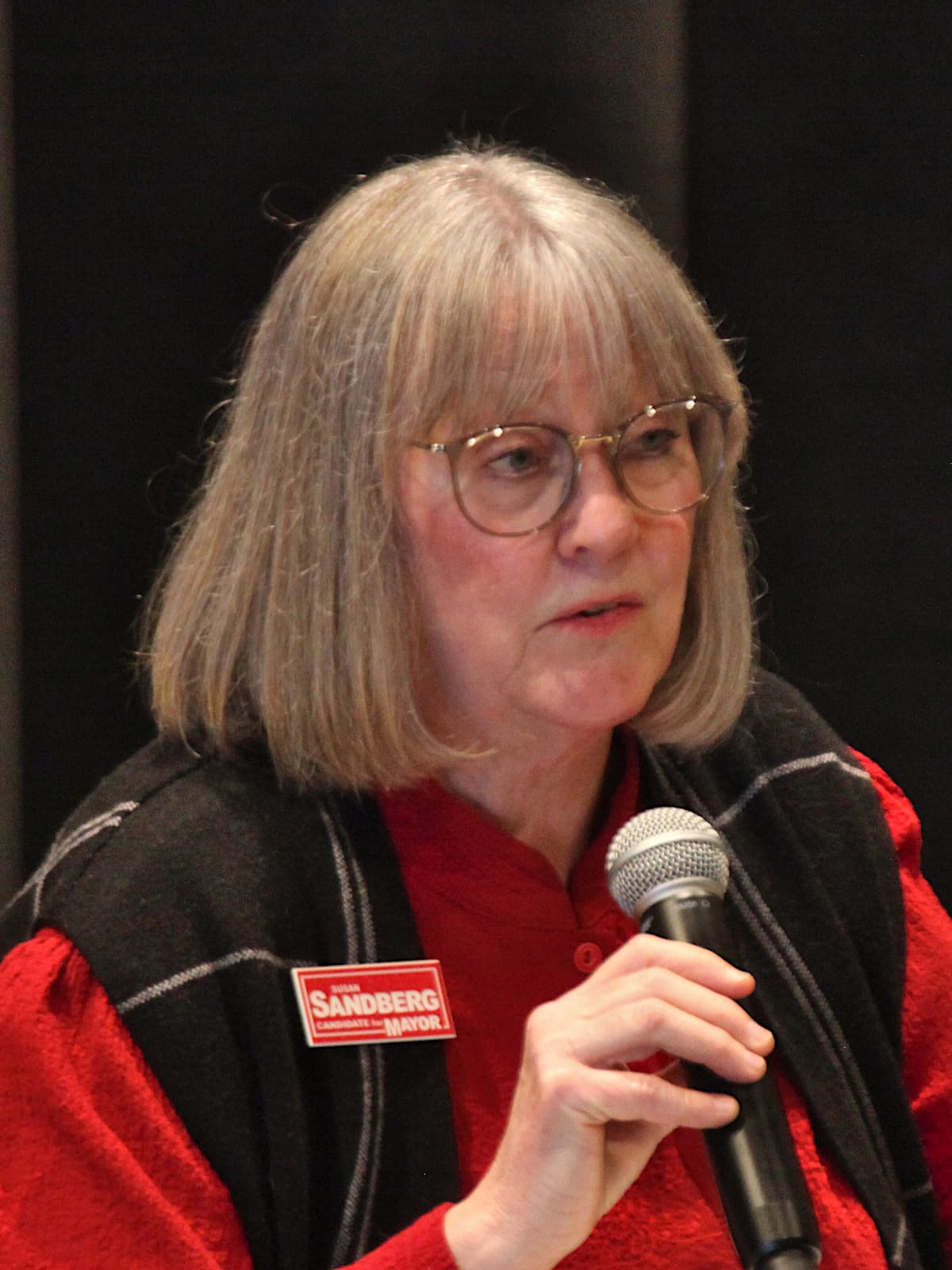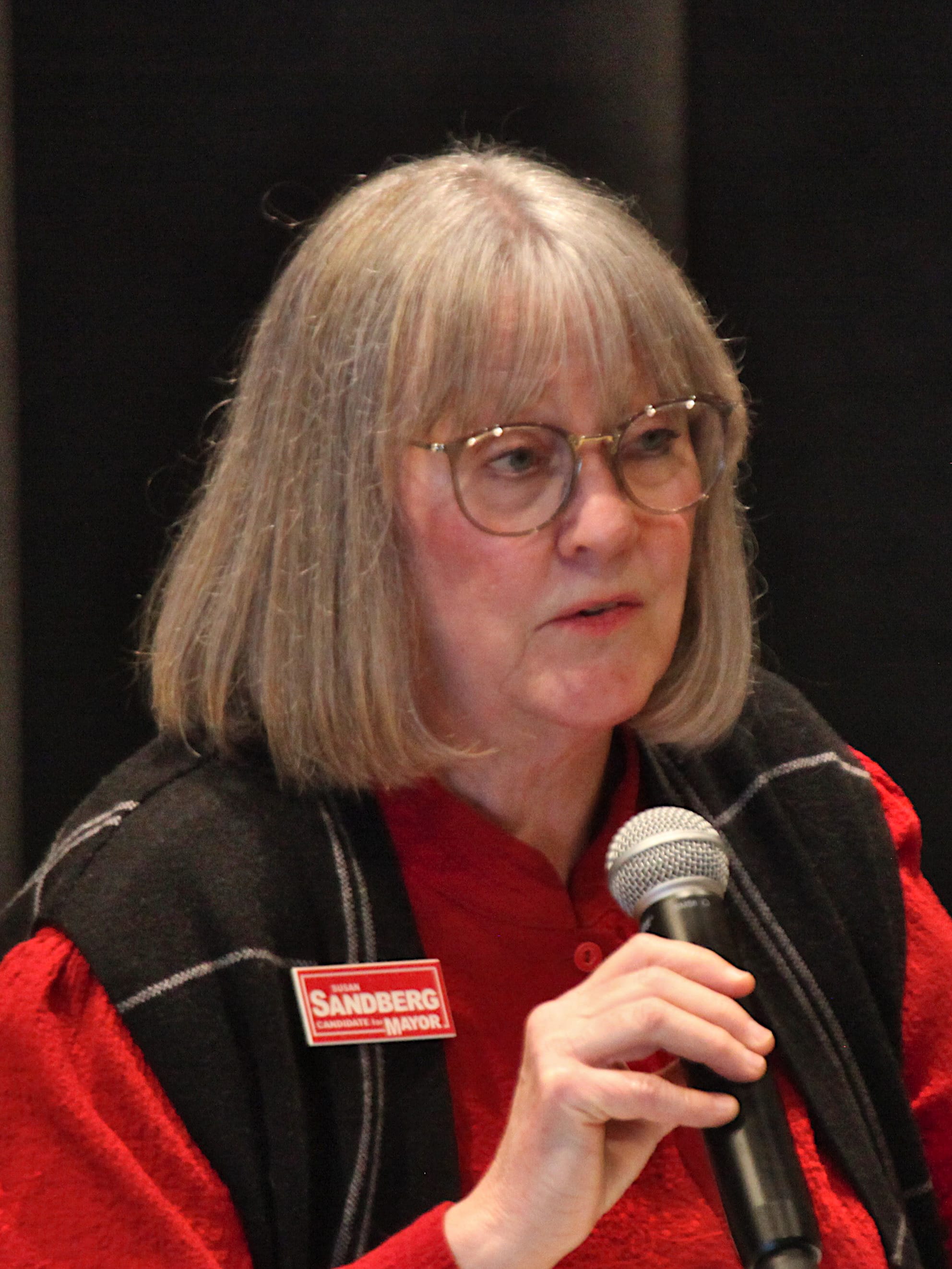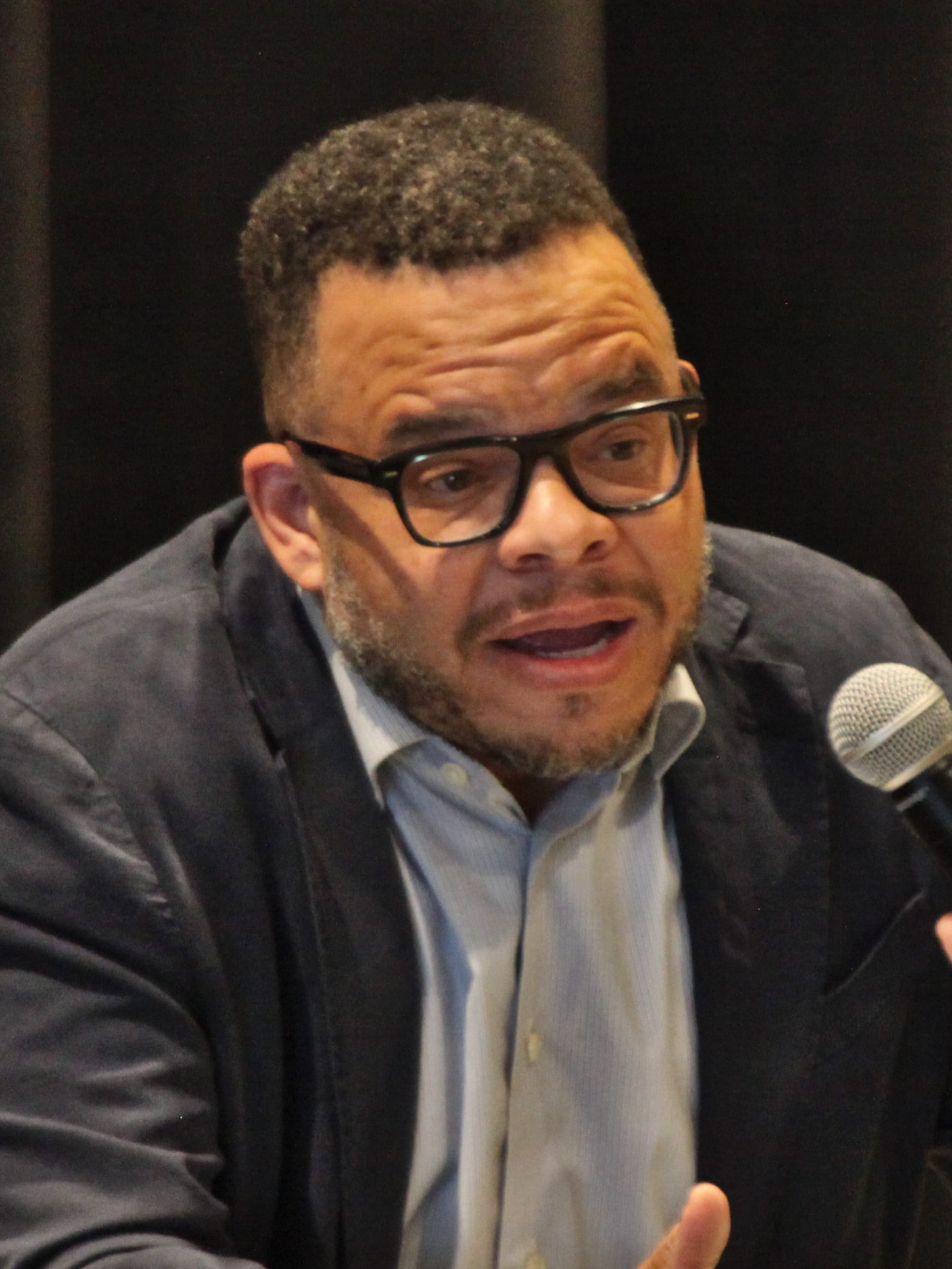Democratic Party’s mayoral candidates talk annexation, encampments, Lower Cascades closing




For 90 minutes on Monday night at Tri-North Middle School, the three candidates for the Democratic Party’s nomination for mayor of Bloomington fielded questions at a forum hosted by the League of Women Voters of Bloomington-Monroe County.
Seated from left to right on the stage of the school’s performance center, in front of an audience of about 40 people, were: Susan Sandberg and Kerry Thomson, and Don Griffin.
Asking the questions was Indiana University Maurer School of Law student, Laura Rusk. This report does not try to cover every question asked at the forum.
Community Access Television Services (CATS) was on hand to record the proceedings.
Monday’s forum took place on last day before the start of early voting, which begins Tuesday, April 4 at 8 a.m. The League of Women Voters maintains a list of upcoming candidate forums, for mayor and for city council races.
Annexation was a topic where some daylight had already been established between the candidates, and that distance was also apparent on Monday night. Griffin is in solid support of annexation, Sandberg in solid opposition Thomson is somewhere in between.
Although they disagree on annexation, Sandberg and Griffin found common ground on a recent proposal by Bloomington mayor John Hamilton to close Lower Cascades Road (Old State Road 37) to car traffic. Neither Sandberg nor Griffin want to see the road closed to automobiles.
The wording of the question went like this: “The sense is that those who would like to see Old State Road 37 closed, and the space transition to a green space, have few advocates in government. What is your position?”
Thomson did not state a position on the road closure, but analyzed the preamble to the question, saying, “The problem that this questioner has brought up, is not actually about the road—it’s about their access to their government.”
At Monday’s forum, the three candidates also responded to a question about the Seminary Park encampment that was the subject of a proposed ordinance in 2021.
The ordinance on encampments, which would have provided some protections for people camping in public parks, was supported by four city councilmembers (Matt Flaherty, Kate Rosenbarger, Isabel Piedmont-Smith and Steve Volan), which was not enough to pass it. The council’s deliberations on the ordinance took place at a notorious nine-hour city council meeting. As a city councilmember Sandberg was a part of the marathon meeting.
On Monday, Sandberg said many lessons had been learned about the planning that is required when a decision is made to evict people from a public place, in order to do it humanely. She added, “But I stand by my vote, that public parks are not the place for an encampment.”
Thomson recounted how she had handled an encampment on property where Habitat for Humanity was planning to develop a neighborhood, when she was Habitat’s CEO. She had spent months walking the area, talking with campers and coordinating with city entities and social service organizations, so that when it came time to start construction, the encampment residents had voluntarily departed, Thomson said. “I am very proud of the dignified process that we provided,” Thomson said.
Griffin started his answer by saying, “I wasn’t part of the government at that time.” He continued by saying, “We do have things in place where there is no camping in either the parks or public property.” As he was describing the city’s process for displacing an encampment, Griffin said, “I’m sorry, I’m drawing a blank.” Griffin wrapped up by saying, “I don’t think I would have done it the way it was done before. There are things in place is what I’m saying.”
The displacements of the Seminary Park encampment came in late 2020 and early 2021. Griffin did not assume the deputy mayorship until late April of 2021. He resigned as deputy mayor at the end of 2022 in order to run for mayor.
The city’s displacements of the encampment at Seminary Park were followed by the displacement of a Grimes Lane B-Line bridge encampment in August of 2021. By that time, Griffin was deputy mayor.
There was at least one administrative difference between the displacement of the Grimes Lane encampment and the one in Seminary Park. By August of 2021 a general police order had been issued, which lays out the steps that are to be taken when an encampment is displaced.
More on annexation
It was Griffin who first floated the topic of annexation on Monday night, when he answered this question: “What will be your first step as mayor to address the need for affordable housing?”
None of the three candidates gave one “first step.”
It was Sandberg who had the first crack at the question on affordable housing. She started by saying, “Affordable housing is another complex issue.” Sandberg continued, “Affordable housing gets built with subsidies. It gets built by partnering with the organizations who know how to develop and build affordable housing.”
She added, ”So we must do much more reaching out to those companies and the people who know how to leverage the federal tax dollars and incentives and know all about how to engage in that kind of subsidy work, because it is expensive to build housing.”
Thomson said, “We need to activate some of the buildings that are being underutilized. And that will take a complete inventory of what we have in existence and where the vacant space is, to determine whether or not we can activate that for housing.”
Thomson continued, “Build partnerships and collaborations, and especially take that 2020 housing study that we did off the shelf and write an implementable plan of action that our community can get behind.”
Griffin built on Thomson’s mention of the 2020 housing study, by noting that he served on the steering committee for the study—his name can be found on the second page. Griffin would also take that study off the shelf, he said.
Griffin also said that he would look for “opportunities that are already within our community, first with properties that the city owns, such as Hopewell.” Hopewell is the site of the former IU Health hospital, where Griffin said the city is hoping to build at least 1,100 housing units, a majority of them affordable.
Griffin wrapped up his answer to the question about the first step to address the need for affordable housing, by floating annexation as a possibility.
“We’ve already had the planning department, utilities—those folks are looking at those maps right now to determine how many more houses we can get within our current city limits,” Griffin said. He added, “And then we need to look at annexation. I’m just gonna say it: We need and we need to look at annexation to get more opportunities for affordable housing—either voluntary or the way we’re going right now.”
Responding to a question from the moderator about the candidates would continue with annexation, Griffin finished his answer by saying, “I can’t understand how people who are Bloomingtonians don’t want that ability [to annex territory], ever. So I would continue on with annexation.”
“And I would not,” said Sandberg, as soon as the mic was handed over to her.
Sandberg continued, “Annexation was fraught with problems from the very onset.” She added, “Seven years ago, when it was first proposed, it was massive. It came as a great surprise, not only to our county colleagues, but to those of us on the city council.” Sandberg is cautious about annexation generally. Sandberg thinks that adding territory to Bloomington will put a strain on city services.
Thomson was seated between Sandberg and Griffin and made use of that fact when she talked about her position on annexation: “It’s quite appropriate that I’m sitting in the middle tonight.”
Thomson delivered sharp criticism of the way Bloomington mayor John Hamilton’s administration had approached the process: “Listen, the current administration has handled annexation all wrong. It feels more like a hostile takeover than welcoming new boundaries to our city.”
But Thomson added, “Do I think that our city boundaries need to expand? Probably. … I do think that we can write a stepped plan to provide the services needed, should annexation happen.”
Thomson described annexation as in part a choice about how dense Bloomington’s population should be: “If we want housing without annexation, that is going to mean that we need more people on the same amount of land. If we don’t want more people on the same amount of land, then we need annexation.”
In the last week, all three candidates responded in writing to a specific emailed question from The B Square, about whether they would withdraw Bloomington’s currently pending lawsuits—one for each annexation area—against the Monroe County auditor. Bloomington filed suit over which annexation waivers were counted as valid. The big question of law concerns whether a state law passed in 2019, which invalidated many remonstration waivers, conforms with the Indiana Constitution.
Withdrawing the lawsuits against the Monroe County auditor would end annexation in all but two of the territories where the city council approved annexation.
Sandberg gave a one-sentence answer about withdrawing the lawsuits: “After carefully reviewing the law, and the available paths to withdraw the case, my answer is yes.”
Griffin’s answer indicated that he would not withdraw the lawsuits. Griffin started like this: “If the choice is between stopping completely, or moving forward, I will continue the process of annexation.”
Thomson was more cautious than Sandberg: “I will seek independent legal opinions on all the ramifications of withdrawing from the lawsuits, but, yes, one option I would consider is pausing the legal proceeding…” Their complete answers to that B Square question are included below, along with a second question related to annexation.
The second B Square annexation question is about the city of Bloomington utilities (CBU) recently-adopted policy about extending service to areas in Monroe County outside the city of Bloomington while the annexation litigation is still pending.
According to the case management plan for the lawsuits against the county auditor, the hearing on the city’s motion for summary judgment is supposed to take place on or before Oct. 20, 2023. That means there’s an outside shot that those lawsuits could be wrapped up before the end of the year. One scenario where that happens is that the hearing is held, the judge rules in the city’s favor before the end of the year, and the Monroe County auditor chooses not to appeal.
Griffin thinks that it will take longer than that: “What’s happening right now in the courts, you’re looking at three, four years, maybe more. So I better have a plan going forward that looks at our community, whether or not we have annexation or not.”
Thomson thinks there’s a chance the litigation could be over before the next mayor takes office: “There is a long time between now and January 1 for these lawsuits to potentially be settled.”
B Square Question 1: If on Jan. 1, 2024, the city of Bloomington’s litigation against the county auditor is still pending in a way that would allow for the city of Bloomington to unilaterally withdraw the lawsuit against the auditor, with the effect that annexation would be stopped in all those areas where signatures from at least 65 percent of landowners were collected according to the auditor’s tally, will you consider withdrawing the case?
Kerry Thomson: I will seek independent legal opinions on all the ramifications of withdrawing from the lawsuits, but, yes, one option I would consider is pausing the legal proceeding for two reasons. First, the entire annexation process has been seriously flawed from the outset. In order to be principled, fair and equitable to all involved, city government needs to take a step back and assess the entirety of the situation to determine the best course of action.
Second, a “win” for the city could well be a loser for all citizens – both current city residents and people living in the proposed annexation area. Because the proposed annexation was such a major overreach by the mayor, the sheer size of the newly annexed area will be massive. State statute requires city services be extended to newly annexed territory in a relatively short amount of time. Given the fact city government is already struggling to provide adequate services to existing residents, adding more than 15 square miles and 14,000 more people to the city at once is nonsensical. There is a real risk of diluting city services to current city residents and not being able to meet commitments to newly annexed areas. For instance, there’s already a significant vacancy rate in the police department. Does it make sense to add need for far more officers when we’re not living up to current obligations? Annexation is another example of our city pushing a solution without first discussing it with the people most impacted.
The entire annexation misadventure needs to be paused, the mayor’s edict scrapped, and the whole community brought together to determine Bloomington and Monroe County’s collective future.
Don Griffin: If the choice is between stopping completely, or moving forward, I will continue the process of annexation. At this time, I believe annexing in order to accommodate the population growth our city has experienced without physical growth to support it, is a wise decision and supports Sustainability, increased Housing opportunities within city limits, Economic and Cultural Growth, and approaches to Diversity, Equity, Inclusion, Accessibility, and Belonging. Of course, if elected I will assemble a leadership team of smart people and I will listen to them. From day one in office, my fiduciary responsibility is going to be to the City of Bloomington and I will do what’s best for Bloomington. This will be an immediate issue of discussion and will require looking at a multi-year forecast with the City Controller. I will then have a better idea of what our community needs moving forward.
Susan Sandberg: After carefully reviewing the law, and the available paths to withdraw the case, my answer is yes.
B Square Question 2: The City of Bloomington Utilities (CBU) appears to have adopted an interim policy of not making any sewer connections outside city limits while the current annexations are still pending. That means no new housing is being built in [the unincorporated part of] Monroe County, if that housing depends on a CBU connection. On taking office, will you consider directing CBU to abandon its policy against making any new connections while the annexations are still pending?
Kerry Thomson: On August 22, 2022, the Hamilton administration, in a one-half page memo, requested that the Utility Service Board, “reduce sanitary sewer expansion outside of City municipal boundaries down to those instances where a valid petition for voluntary annexation has been received. This edit is proposed against the backdrop of ever increasing (sic) legislative hostility towards annexation and the historic use of waivers of right to remonstrate.”
The USB approved that rules and regulation change on August 29, 2022, with a 5-1 vote. The minutes of that meeting include only this 45-word summary: “The second order of business was Proposed Changes to Section 24, comprehensive and systematic growth of CBU’s sanitation sewer system and annexing properties that would like to hook up to the city sewer. The committee voted in favor of the proposal but was not unanimous.” That’s it. Despite the importance of the issue to the housing shortage in our community, the public notice and public record of this policy shift consists of little substantive discussion. I don’t believe the county government, city council as a whole, or the general public was alerted to the change or asked for their opinion or input.
Who asked for this change? Who is directly and indirectly impacted by it? How has this decision hurt the housing market? How much has the policy shift increased housing costs in our community? Did city leaders even consider these questions prior to acting?
It appears to be yet another in a long line of unilateral actions taken by City Hall that should have been handled more professionally. I commit to providing responsible leadership when it comes to city government policymaking. I’ll seek the input of all stakeholders, listen to staff’s opinions, seek to understand USB’s reasoning for voting for the change, weigh all the alternatives, and then decide upon the best course of action.
Don Griffin: At this point, I am not keen on changing course regarding current CBU policy, which is actually something that I recommended as deputy mayor. The City provided sewers and utilities in exchange for waivers that guaranteed voluntary annexation when the time came. According to the state of Indiana, those waivers are now worth nothing.
I am interested in clear resolution and forward steps—not a repetitive cycle of disagreement. While there may be some opportunities to ease up on the moratorium, as an advocate for the City of Bloomington I am invested in coming to a conclusion with both annexation and CBU policy. That conclusion needs to best serve the City of Bloomington and that means City of Bloomington utilities are for Bloomington residents who pay city taxes. That statement is not about cutting people out; it is about welcoming people in.
Susan Sandberg: The CBU, while part of the City administration, is governed by a separate Utilities Service Board and is primarily funded by rate payers. As such, I would collaborate with the CBU and respect their decision based on the fiscal feasibility of extending services outside City boundaries while the legalities of annexation are still in limbo. One reason I oppose annexation is to establish clearer expectations about how City and CBU services are extended to County areas, and when they are, how those services are to be adequately financed. I will simultaneously partner with County officials and planners in finding suitable avenues to pursue affordable housing in both of our jurisdictions.
[CATS video: April 3, 2023 League of Women Voters mayoral forum]




Comments ()